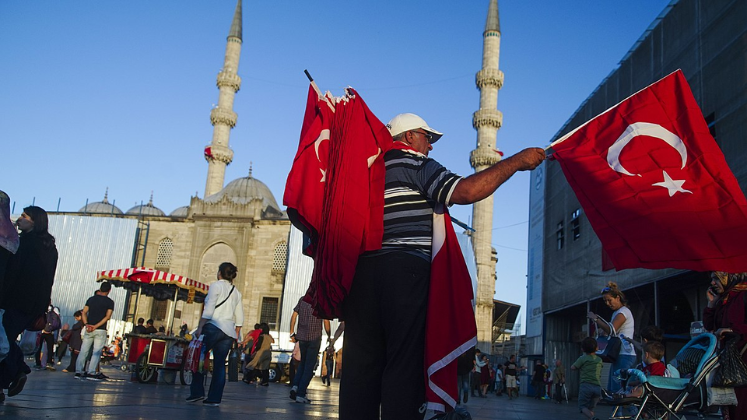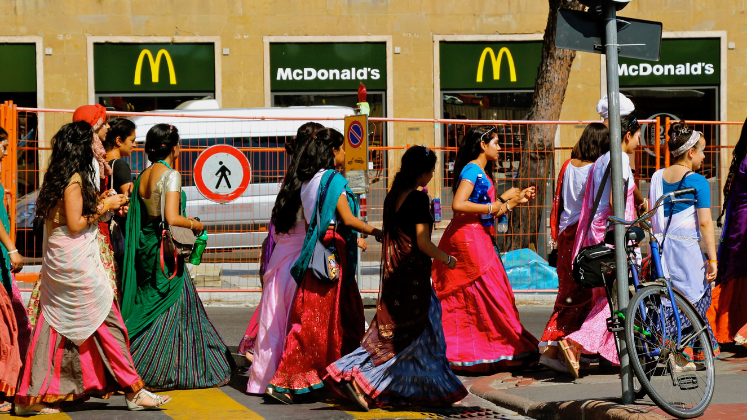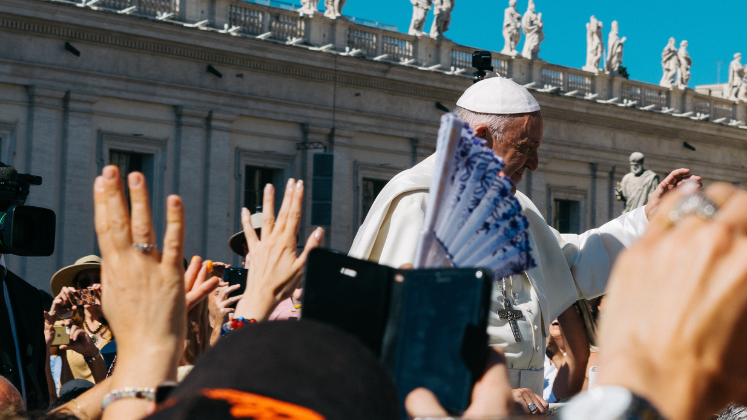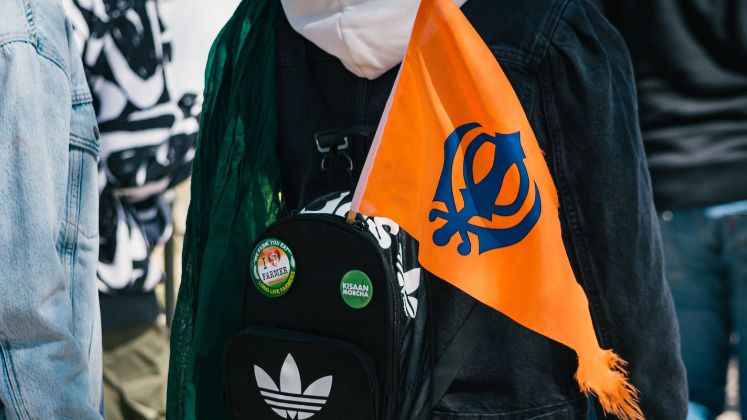In Turkey, where secularism was once considered overly forceful if not an outright attack on religious people, elections and prayers are now combined in unprecedented ways. In this article, Professor Sultan Tepe analyses the use of religion in Turkey’s recent presidential election.

Turkey’s Election High Council forbids all political parties from campaigning and the media from airing any political messages after six o’clock the day before the elections. All parties finished their campaigns and started eagerly awaiting the results of what may have been one of Turkey’s most contentious elections in recent memory—the first presidential election on May 14. Despite the ban, President Recep Tayyip Erdoğan was on his way to the Hagia Sophia (Ayasofya-i Kebir) Mosque, for evening prayer. The pro-government media had already reported that Erdoğan would conclude his campaign with an “election prayer” at Hagia Sophia. Numerous reports on Erdoğan’s Hagia Sophia visit also referenced a prayer he cited at the 2018 Erdoğan’s Adalet ve Kalkınma (Justice and Development) Party congress.
Erdoğan has been infusing more religious statements into his appeal, particularly since the failed coup was linked to his old allies, the Gulenists, an Islamist transnational network now designated as a terrorist organisation. In fact, to a large extent, Erdoğan’s political appeal rests on his ability to seamlessly combine religious symbols, ideas, and practices with political discourse. On the eve of what was predicted to be a close election, after reciting a passage from the Quran (Surah Bakara), “This unity must be permanent,” Erdoğan told the congregation, “The entire Muslim world is in support of our unity. Enemy groups are following the opposition. I pray that God forbids it. Let’s continue to stay as a united group. I pray that God will provide us with the desired outcome”. Before his prayer at Hagia Sofia, Erdoğan visited the head of the İsmailağa Community, one of Turkey’s most conservative and best-organised Islamic groups, at his residence with chants of Allahu Akbar (God is great) Erdoğan’s election prayer, which began around 8.30 pm, and his widely circulated prayer from the 2018 party conventions exemplify how the walls between the mosque and politics in Turkey have become increasingly porous in recent years. Such performances deflect criticism on the grounds that they represent religious dedication rather than political commitment, yet they serve as an important component of political campaigns, reminding voters how a politician will fight for the beliefs of Turkey’s majority. Thus they create a religio-political discourse that enjoys the protection of freedom of belief, whereas their secular counterparts’ statements about beliefs are strictly scrutinised.
Although the evening prayer appeared to be a routine ritual, Turkish politicians have been avoiding “bringing politics to the mosques” since the beginning of the Republic. Thus, turning a mosque into a campaign site is a new practice. Yet, Turkey’s 2023 presidential elections lacked any sense of routine and normalcy – according to the International Organization for Migration, three million people have been displaced, and an additional 1.6 million people are still living in the informal settlements run mainly by the government since the devastating earthquake of February 6. The legality of Erdoğan’s candidacy was disputed. Many questioned whether Erdoğan could run for a third time, given the country’s term limits despite its new presidential system. The elections were also held amidst one of the country’s worst economic crises. Even with the utterly optimistic measurements of the state statistical institute, Turkey’s inflation rate was 64% in 2022, placing it at the top of the world list along with Venezuela. 20% of young people could not find a job, and Turkish citizens had joined Syrians and Ukrainians in topping the charts of asylum requests in Europe.
Given the worsening economic woes, Erdoğan desperately needed prayers to win the first round, but he failed to get 50% of the vote. His chances of making it to the run-off seemed to have improved after he convinced the third presidential contender, a conservative Turkish Nationalist candidate, Sinan Oğan, who had received the critical 5% of votes, to back his campaign in exchange for some access to state authority. But despite better odds before the run-off elections on May 28, Erdoğan again disregarded the electoral process. With cries of takbir (God is Great) he concluded his campaign at Istanbul’s most revered mosque, Eyüp Sultan Mosque. With Oğan on his side Erdoğan defeated by three million votes Kemal Kılıçdaroğlu, a Kurd and a member of the Alevi Muslim minority, a non-orthodox sect that the Sunni majority views as heretical.
In Turkey, where secularism was once considered overly forceful if not an outright attack on religious people, elections and prayers are now combined in ways that have never happened before. As Margaret Canovan notes, populism’s power lies in its ability to create a mental map of politics and bring politics back to the people by making it simple and comprehensible. It can focus on the present, be pragmatic, or view the future as redemptive. Erdoğan’s populism shows such categories need further elaboration. Instead of treating vox populi, vox dei (the voice of the people, as the Voice of God), Erdoğan’s brand of populism turns every election into a cosmic war portraying it as a competition where the voices of the people and God are at stake. The treatment of elections as the extension of religious space and as a referendum on a single issue makes opposing Erdoğan’s political rhetoric rather challenging. Erdoğan does not bring the sacred to politics. Instead, he sacralises politics and turns elections into a plebiscite on people’s faith or a religious ritual.
Some were taken aback by Erdoğan’s victory given the severity of the economic crisis, while for others, Erdoğan’s well-oiled political machine, which relies on his command of the media, the state’s redistributive policies, and the capacity to mobilise risk-averse publics works like a charm regardless of the conditions. Some were quick to blame the opposition candidate from the secular, Cumhuriyet Halk (Republican People’s) Party, Kemal Kılıçdaroğlu who took a risk, made contested compromises to form a broad yet fragile pro-democratic coalition by incorporating clashing right-wing nationalist and pro-Islamic parties with the backing of the left-wing Kurdish Green Left and the Turkish Workers Party. Such accounts ignore religion’s multidimensional impact from affective, institutional, agenda-setting to the individual interest level. More importantly, they suggest that the change in Turkey’s democratic system can be addressed by the right types of candidates and leaders from the majority faith.
Yet, Erdoğan’s populism and electoral miracles hinge on many pivotal institutions like Diyanet, Directorate of Religious Affairs (Turkey’s state institution that controls all of its mosques and religious publications and employs all of its prayer leaders), its transnational network, epistemic and mobilising capacity. Diyanet’s budget, which does not reflect the funds of its foundation – often dwarfs other state institutions (its current budget is four times more than the directorate of migration), and its network reaches out to even the most isolated rural communities in the county. Thus, Erdoğan’s reliance on religion not only works symbolically or affectively through his public display of rituals but also through the impact of Diyanet’s employees (over 140 thousand), mosques, and publications. Turkey’s Diyanet, now directly controlled by Erdoğan, oversees not only the ninety thousand mosques and all prayer leaders employed in them but also the content of the Friday sermons. Thus, Erdoğan can spread and amplify his political messages through Turkey’s mosques and prayer leaders under his direct supervision. It was no accident that the same message of unity (of Sunni Muslims) was echoed in the mosques during Friday Prayer the day before Erdoğan delivered the same message in the Hagia Sophia Mosque. Likewise, the imams were preaching the importance of family values and the threat to them at the same time as Erdoğan centred his run-off campaign on protecting families against deviant forces such as LGBTQ+ people and the country’s economic and political stability.
Based in Turkey but active in communities worldwide, Diyanet is a transnational organisation that promotes communication and cooperation between the Turkish diaspora communities and the Turkish state. Given the critical role of diaspora voting in changing election outcomes, Diyanet facilitates Erdoğan’s outreach to Turks living in other countries as well. Just as in the contentious 2015 November elections, Erdoğan turned the 2023 elections into a referendum on identity and security, further deepening the country’s polarisation. Topics covered in Diyanet-controlled Friday sermons leading up to the elections included “Spirit of Unity and Togetherness” (May 26, 2023) and “Our Youth Are Trustees of Our National and Spiritual Values” (May 19, 2023), “Women and Men: Worthy of Respect, Honourable Being” (May 12, 2023) and “Waste: Burning While Consuming” (May 5, 2023). They echoed Erdoğan’s main campaign themes and added religious credence to arguments that the opposition undermined Turkey’s family values. They also warned the crucial number of young people who were to vote for the first time of their religious obligations and advanced efforts to reframe the ongoing economic crisis as more about consumption than poor economic decisions.
While most world leaders deliberately avoid public displays of faith, Erdoğan’s assertive religious populism turns to prayers and bolsters his reputation as a devout believer-politician. Given the leverage of Diyanet-like networks, Erdoğan did not have to do much to challenge his opponent Kılıçdaroğlu. Alevi ritual sites in Turkey are not afforded the same state protections as mosques due to the country’s determinately Sunni political culture. Some critics were against Kılıçdaroğlu running for office because they believed a critical number would not vote for him due to his ethnic-religious identity and his lack of charisma (populist qualities). Erdoğan campaigned on a platform of national security (primarily directed at the Kurdish minority) and identity (primarily directed towards non-Sunni Islamic groups and LGBTQ+ minorities). Data from the Turkish census does not include questions on religious affiliation, although polling organisations estimate that 76% of Turks identify as Sunnis. Therefore, oppositional leaders like Kılıçdaroğlu swim against the current as Erdoğan takes the politically expedient route of mobilising and consolidating the Sunni majority in Turkey’s politics, which thrives on sectarian, ideological, and ethnic divisions.
The May 14 parliamentary election resulted in a less-than-resounding win for Erdoğan’s People’s Alliance, which won 323 seats but fell short of gaining a super majority in a 600-seat parliament. Likewise, the Justice and Development Party’s vote share dropped to 35 percent, nearing its 2002 level. What makes Erdoğan’s reliance on religion risky is that when the regime underperforms and faces challenges, Erdoğan turns to the appeal of religion and religious networks to mobilise, communicate and convince his base. Religious populist leaders are often seen as the moral archetype (exemplary figure) or the Saviour (self-sacrificing leader). To add to the list, Erdoğan has proved to be a Miracle Worker by producing positive outcomes amid extremely challenging economic circumstances. Yet, the miracles are aided by tight transnational networks such as those maintained by Diyanet or a collage of deceptive images—that Erdoğan admittedly described as the work of some creative young people—which linked the oppositional leader to the Kurdish PKK militants.
Turkey’s political system and economy will need another set of miracles as it prepares for a new wave of economic crises. What makes Erdoğan’s style of populism a precarious democratic practice is that it does not bring religion to politics but turns politics into a religious field or sacralises politics. Although democracy is essentially a process of contestations and compromises, nothing except fundamental rights is seen as a zero-sum game; when politics is sacralised, all issues become moral questions or zero-sum contestations. Right after the elections, a chorus of Turkey’s pundits and scholars levied the harshest criticism of the opposition leader for not winning the elections. Kılıçdaroğlu, not Erdoğan, was accused of stealing the election with his irrational candidacy and efforts to build a broad coalition, given that the odds were against him. In Turkey’s increasingly narrowed political field, many await a benign and better populist from the majority faith to defeat Erdoğan. However, autocrats’ powers are tenacious, and elections in Turkey are not an exception.
Religious populists not only control the game’s rules; they also alter the essence of the game. Brazil’s Bolsonaro, Israel’s Netanyahu, and Hungary’s Orban pursue similar policies and religio-political discourse, mobilise religious networks and sacralise politics. In Turkey, an increasingly belief-based mobilisation or impact of religious populism is taking place in a system where many talk about “voting security” and express uncertainty about the proper counting of cast ballots, adding to a multitude of concerns about “fair” campaigning. According to data from Turkey’s state-run television, TRT, Erdogan was allotted 32 hours and 47 minutes of airtime, while his coalition partner Devlet Bahçeli received 25 hours and 27 minutes. The 32 minutes given to opposition leader Kılıçdaroğlu made it impossible to counter the dominant narrative, showing how Turkey’s playing field of democracy is more uneven than ever. Likewise, some fundamental election processes in Turkey are now a mystery in themselves—e-government-centered voter registration and verification have made the registration process less transparent and accountable, while opposition parties have failed to verify voting and tallying in the country’s 197,000 polling stations, leading to persistent doubts about the validity of election results. Even more importantly, the High Election Council’s (an organisation tasked with ensuring free and fair elections) neutrality has been called into question due to its handling of disputed municipal elections in 2019.
Bolsonaro’s predicament in Brazil shows that even under populist government rules, the results of elections can be different when the institutions manage to maintain their autonomy and the media remains free. Against the backdrop of the rapid growth of religious populism, the recent elections in Turkey serve as a timely reminder that it is imperative to defend democratic values (e.g., equal inclusion or non-discrimination), fairness, and due process simultaneously. Unfortunately, there is a tendency among some observers and researchers to acknowledge that elections were not fair while simultaneously claiming that they were still free, lending legitimacy to increasingly anti-democratic practices by over-stretching some concepts such as competitive authoritarianism. Treating a plethora of election irregularities, like turning mosques into campaign sites, as acceptable, only erodes democratic practices and blurs the lines between religious conviction and political decisions. Only by sustaining the main pillars of democracy without making exceptions and questioning the election results that fail to uphold them can we ensure that democratic principles will endure and not fall prey to a system in which fairness, fact-based evaluations, or political reasoning become secondary to the practices that serve to maintain political dominance or the dominance of a politically captured religion.






1 Comments